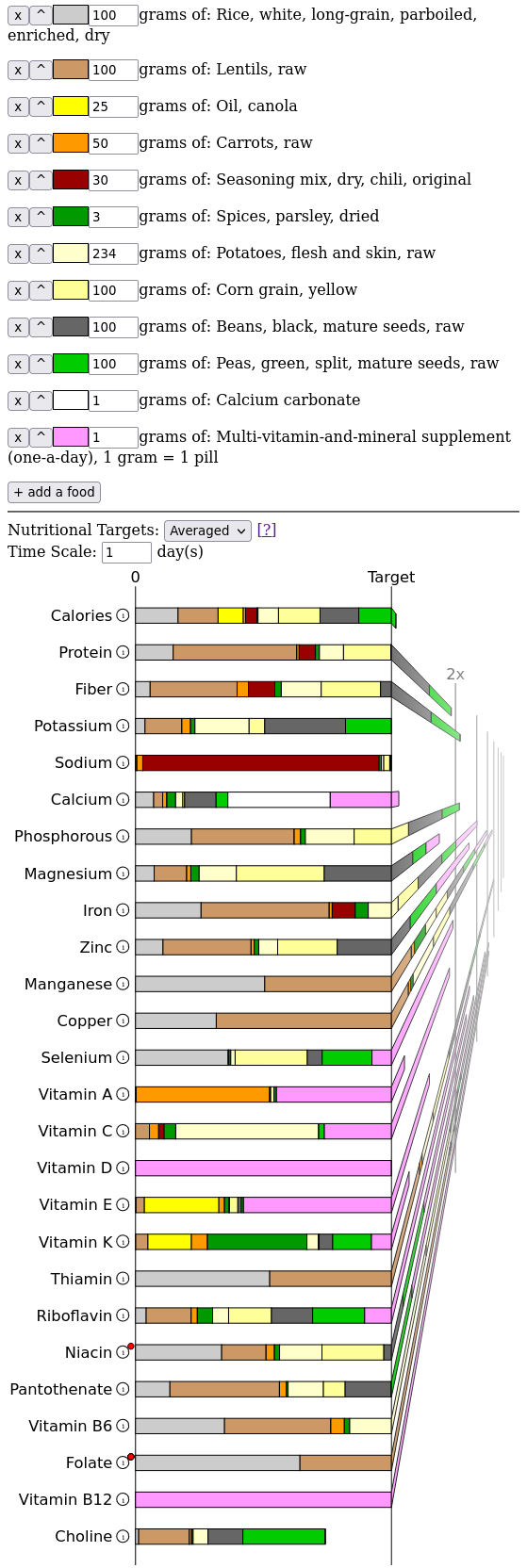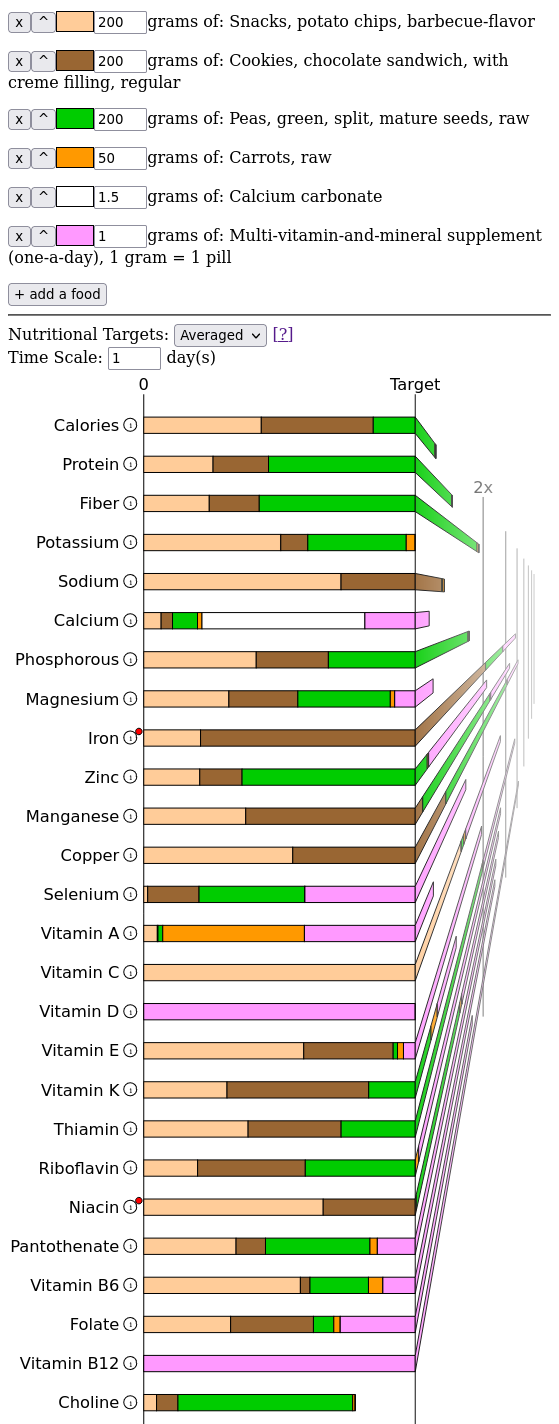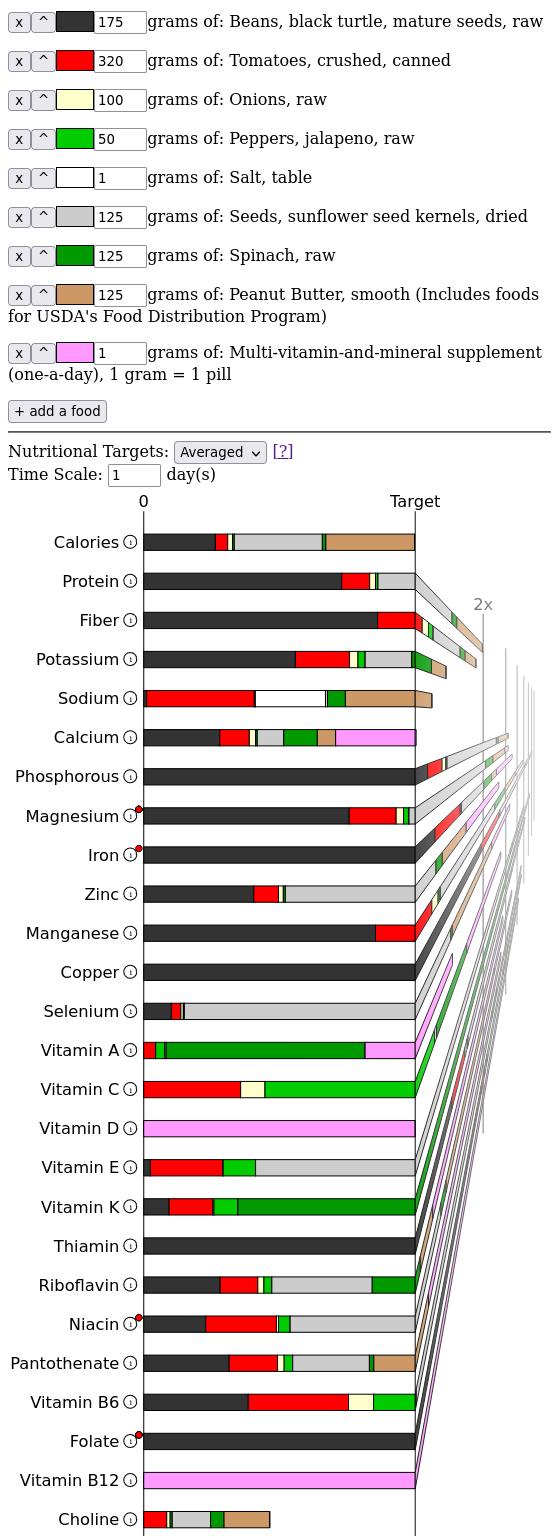Old:Plant-based 2
Plant-based food has many options. There are countless dietary choices that could be healthy, unhealthy, cheap, expensive, low-calorie, high-calorie, low-protein, high-protein, etc.
This page is about ways to eat well with at least 95% of protein/calories coming from plants.
Some pictures
-
Chili
-
Garlic bread
-
Split pea soup
-
Chips
-
Peppers
-
Bean soup
-
Pasta
-
Beetroot soup
-
Cake
-
Vegetable juice
-
Ramen
-
Chick pea masala
-
Fries
-
Rice and daal
-
Lots of fruits
-
Cookies
Balanced diets
Despite a lot of misinformation out there,
It is possible to meet all of your nutritional needs by eating plants
To eat more healthy and more cheaply than most people do,
Use these principles as a guide:
If this doesn't seem balanced on first glance, see some of the examples below - it is.
- Note: These examples may not be perfect, but they are far more balanced than a typical diet in most countries.
- Note: You can also play around with the nutrition calculator to analyze your own options.
Nutrition examples
cheap home cooking
A balanced diet with beans, root vegetables, and other ordinary foods.
Screenshot:
Notes:
- Multivitamin is essential here.
- Calcium is supplemented too (typically costs about 10 cents per day), because the cheap foods aren't naturally high in calcium.
- This analysis shows the raw ingredients. Cooking instructions / recipes will be added to this wiki soon. In general, when you boil any food, do not drain the water; keep it for the soup. You don't want to lose some of the minerals (nutrients)
(...)( relevant info: Heat doesn't destroy minerals (...)( scientific reason: the minerals are elements (on the periodic table); the vitamins are molecules that can break down at high temperatures ) , but it does destroy some vitamins. The multivitamin fully compensates for this: Most multivitamin tablets have 100% the recommended daily intake of all B vitamins and vitamin C, which are the ones that can be lost in cooking. ) . - Yes it's all vegan!
junk food method
Yes, it is possible to construct healthy diets with junkfood, in some cases. This is one example.
Screenshot:
Notes:
- Multivitamin is essential here.
- Calcium is supplemented too (typically costs about 10 cents per day), because the cheap foods aren't naturally high in calcium.
- Even if the cookies have small amounts of dairy etc., the vast majority of calories & protein are still coming from plants.
low carb
Screenshot:
Notes:
- Multivitamin is essential here.
- This analysis shows the raw ingredients. Cooking instructions / recipes will be added to this wiki soon.
- Yes it's all vegan!
natural vegan Not an example of the principles above. This tab is included for comparison.
This vegan diet is still nutritionally balanced but far more expensive.
Screenshot:
Notes:
- No supplements are needed here.
- The vitamin D comes from mushrooms.
- The vitamin B12 is in the veggie burger.
- If you really want to avoid processed veggie burgers, you can skip it, eat a bit more of the other foods, and get your B12 from nutritional yeast.
- For maximum absorption of nutrients from the raw kale, make it a smoothie.
typical western diet Not an example of the principles above. This tab is included for comparison.
This section has not been filled in yet.
Rationale
Reasons for choosing plant-based:
In summary
If people ate fewer animal products
- Deforestation could finally be stopped, and
- Massive amounts of farm land could be rewilded, and
- Even with less crop production, there'd be more than enough surplus food to end global hunger, and
- Factory farms could be abolished.
With all of this, it also helps to reduce food waste (the gap between production and consumption)
FAQ
Veganism is a heated topic. This section can hopefully clear up some misconceptions on both sides of the debate. If you want to add more Q&A to this section, please join the discussion.
Q: What to do with all the animals if everyone goes vegan?
A:
- Option 1: Keep them until they die of old age.
- Option 2: Keep slaughtering them at the same rate they currently are.
- In either case, the farmers stop breeding more animals
(...)( except to maintain the species by keeping around ~0.1% of their population (...)( maybe that's more in the realm of scientists, conservationists, zookeepers etc. - but no matter who does it, it's viable ) ) . - In either case, people would still eat meat for another year or so, after pledging to go vegan.
- Maybe the "pledge" part is weird and hypothetical, but so is the idea of everyone going vegan tomorrow.
- If everyone gradually
(...)( as in, people slowly phase out meat in their diets - or people go "cold turkey" vegan but each starting from a different day - or anything in between: there wouldn't need to be a whole lot of coordination between people necessarily; just a general trend of being more plant-based ) went vegan, there'd be no "shock in demand" (...)( as economists would say ) , and thus no "what do we do with the animals". Farmers already control how many animals are bred. They would just breed fewer of them.
More FAQ coming soon.



















